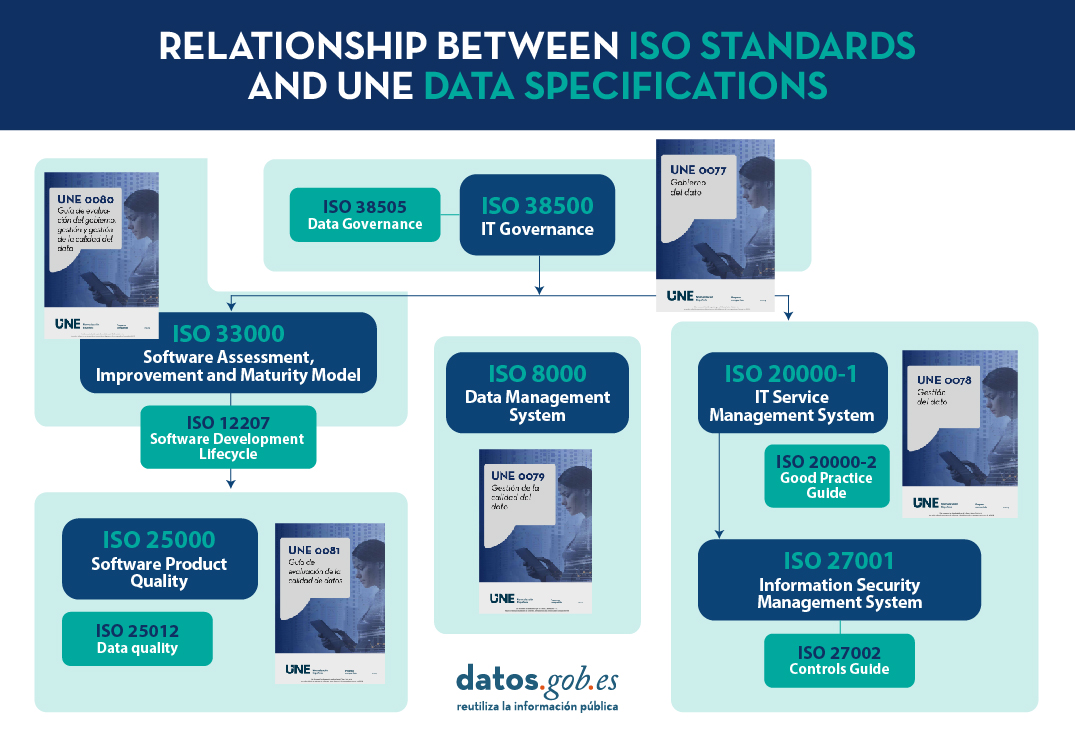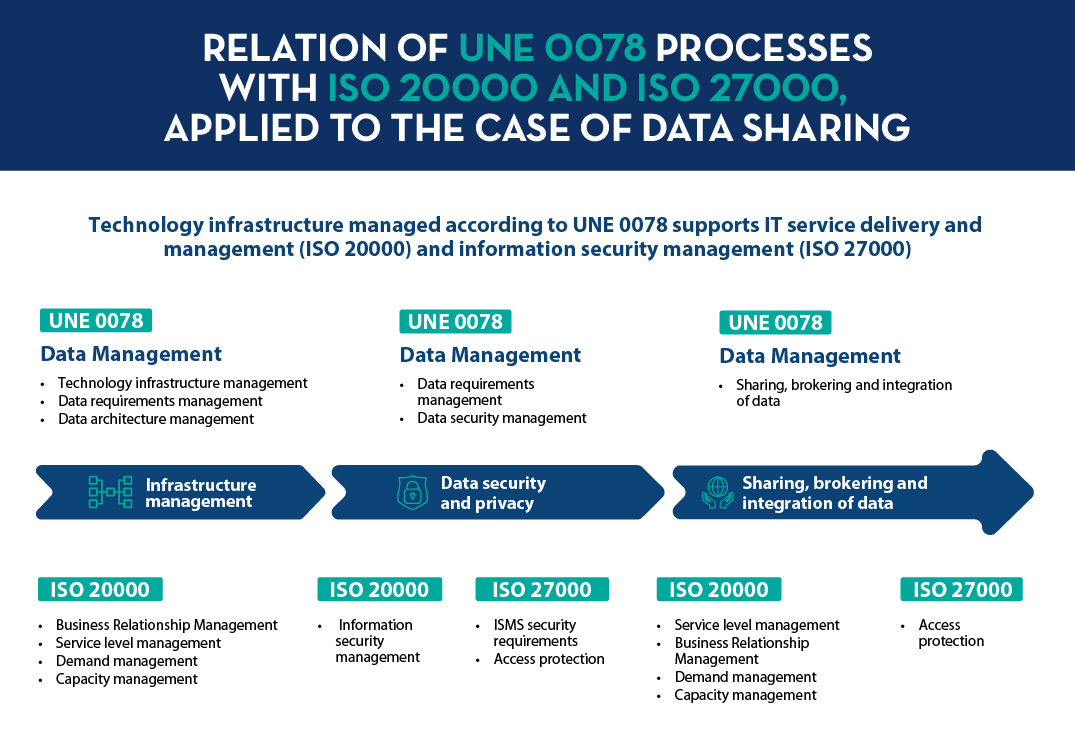UNE specifications as a complement to ISO standards for the governance, management and quality of Information Systems and Technologies
Fecha de la noticia: 01-04-2024

Standardisation is essential to improve efficiency and interoperability in governance and data management. The adoption of standards provides a common framework for organising, exchanging and interpreting data, facilitating collaboration and ensuring data consistency and quality. The ISO standards, developed at international level, and the UNE norms, developed specifically for the Spanish market, are widely recognised in this field. Both catalogues of good practices, while sharing similar objectives, differ in their geographical scope and development approach, allowing organisations to select the most appropriate standards for their specific needs and context.
With the publication, a few months ago, of the UNE 0077, 0078, 0079, 0080, and 0081 specifications on data governance, management, quality, maturity, and quality assessment, users may have questions about how these relate to the ISO standards they already have in place in their organisation. This post aims to help alleviate these doubts. To this end, an overview of the main ICT-related standards is presented, with a focus on two of them: ISO 20000 on service management and ISO 27000 on information security and privacy, and the relationship between these and the UNE specifications is established.
Most common ISO standards related to data
ISO standards have the great advantage of being open, dynamic and agnostic to the underlying technologies. They are also responsible for bringing together the best practices agreed and decided upon by different groups of professionals and researchers in each of the fields of action. If we focus on ICT-related standards, there is already a framework of standards on governance, management and quality of information systems where, among others, the following stand out:
At the government level:
- ISO 38500 for corporate governance of information technology.
At management level:
- ISO 8000 for data management systems and master data.
- ISO 20000 for service management.
- ISO 25000 for the quality of the generated product (both software and data).
- ISO 27000 and ISO 27701 for information security and privacy management.
- ISO 33000 for process evaluation.
In addition to these standards, there are others that are also commonly used in companies, such as:
- ISO 9000-based quality management system
- Environmental management system proposed in ISO 14000
These standards have been used for ICT governance and management for many years and have the great advantage that, as they are based on the same principles, they can be used perfectly well together. For example, it is very useful to mutually reinforce the security of information systems based on the ISO/IEC 27000 family of standards with the management of services based on the ISO/IEC 20000 family of standards.
The relationship between ISO standards and UNE data specifications
The UNE 0077, 0078, 0079, 0080 and 0081 specifications complement the existing ISO standards on data governance, management and quality by providing specific and detailed guidelines that focus on the particular aspects of the Spanish environment and the needs of the national market.
When the UNE 0077, 0078, 0079, 0080, 0080, and 0081 specifications were developed, they were based on the main ISO standards, in order to be easily integrated into the management systems already available in the organisations (mentioned above), as can be seen in the following figure:

Figure 1. Relation of the UNE specifications with the different ISO standards for ICT.
Example of application of standard UNE 0078
The following is an example of how the UNE and ISO standards that many organisations have already had in place for years can be more clearly integrated, taking UNE 0078 as a reference. Although all UNE data specifications are intertwined with most ISO standards on IT governance, management and quality, the UNE 0078 data management specification is more closely related to information security management systems (ISO 27000) and IT service management (ISO 20000). On Table 1 you can see the relationship for each process with each ISO standard.
|
Process UNE 0078: Data Management |
Related to ISO 20000 |
Related to ISO 27000 |
|
(ProcDat) Data processing |
|
|
|
(InfrTec) Technology infrastructure management |
X |
X |
|
(ReqDat) Data Requirements Management |
X |
X |
|
(ConfDat) Data Configuration Management |
|
|
|
(DatHist) Historical data management |
X |
|
|
(SegDat) Data security management |
X |
X |
|
(Metdat) Metadata management |
X |
|
|
(ArqDat) Data architecture and design management |
X |
|
|
(CIIDat) Sharing, brokering and integration of data |
X |
|
|
(MDM) Master Data Management |
|
|
|
(HR) Human resources management |
|
|
|
(CVidDat) Data lifecycle management |
X |
|
|
(AnaDat) Data analysis |
|
Table 1.Relationship of UNE 0078 processes with ISO 27000 and ISO 20000.
Relationship of the UNE 0078 standard with ISO 20000
Regarding the interrelation between ISO 20000-1 and the UNE 0078 specification, here you can find a use case in which an organisation wants to make relevant data available for consumption throughout the organisation through different services. The integrated implementation of UNE 0078 and ISO 20000-1 enables organisations:
- Ensure that business-critical data is properly managed and protected.
- Improve the efficiency and effectiveness of IT services, ensuring that the technology infrastructure supports the needs of the business and end users.
- Align data management and IT service management with the organisation's strategic objectives, improving decision making and market competitiveness.
The relationship between the two is manifested in how the technology infrastructure managed according to UNE 0078 supports the delivery and management of IT services according to ISO 20000-1.
This requires at least the following:
- Firstly, in the case of making data available as a service, a well-managed and secure IT infrastructureis necessary. This is essential, on the one hand, for the effective implementation of IT service management processes, such as incident and problem management, and on the other hand, to ensure business continuity and availability of IT services.
- Secondly, once the infrastructure is in place, and it is known that the data will be made available for consumption at some point in time, the principles of sharing and brokering of that data need to be managed. For this purpose, the UNE 0078 specification includes the process of data sharing, intermediation and integration. Its main objective is to enable its acquisition and/or delivery for consumption or sharing, noting if necessary the deployment of intermediation mechanisms, as well as its integration. This UNE 0078 process would be related to several of the processes in ISO 20000-1, such as the Business Relationship Managementprocess, service level management, demand management and the management of the capacity of the data being made available.
Relationship of the UNE 0078 standard with ISO 27000
Likewise, the technological infrastructure created and managed for a specific objective must ensure minimum data security and privacy standards, therefore, the implementation of good practices included in ISO 27000 and ISO 27701 will be necessary to manage the infrastructure from the perspective of information security and privacy, thus showing a clear example of interrelation between the three management systems: services, information security and privacy, and data.
Not only is it essential that the data is made available to organisations and citizens in an optimal way, but it is also necessary to pay special attention to the security of the data throughout its entire lifecycle during commissioning. This is where the ISO 27000 standard brings its full value. The ISO 27000 standard, and in particular ISO 27001 fulfils the following objectives:
- It specifies the requirements for an information security management system (ISMS).
- It focuses on the protection of information against unauthorised access, data integrity and confidentiality.
- It helps organisations to identify, assess and manage information security risks.
In this line, its interrelation with the UNE 0078 Data Management specification is marked through the Data Security Management process. Through the application of the different security mechanisms, it is verified that the information handled in the systems is not subject to unauthorised access, maintaining its integrity and confidentiality throughout the data's life cycle. Similarly, a triad can be built in this relationship with the data security management process of the UNE 0078 specification and with the UNE 20000-1 process of SGSTI Operation - Information Security Management.
The following figure presents how the UNE 0078 specification complements the current ISO 20000 and ISO 27000 as applied to the example discussed above.

Figure 2. Relation of UNE 0078 processes with ISO 20000 and ISO 27000 applied to the case of data sharing.
Through the above cases, it can be seen that the great advantage of the UNE 0078 specification is that it integrates seamlessly with existing security management and service management systems in organisations. The same applies to the rest of the UNE standards 0077, 0079, 0080, and 0081. Therefore, if an organisation that already has ISO 20000 or ISO 27000 in place wants to implement data governance, management and quality initiatives, alignment between the different management systems with the UNE specifications is recommended, as they are mutually reinforcing from a security, service and data point of view.
Content prepared by Dr. Fernando Gualo, Professor at UCLM and Data Governance and Quality Consultant. The contents and points of view reflected in this publication are the sole responsibility of its author.













